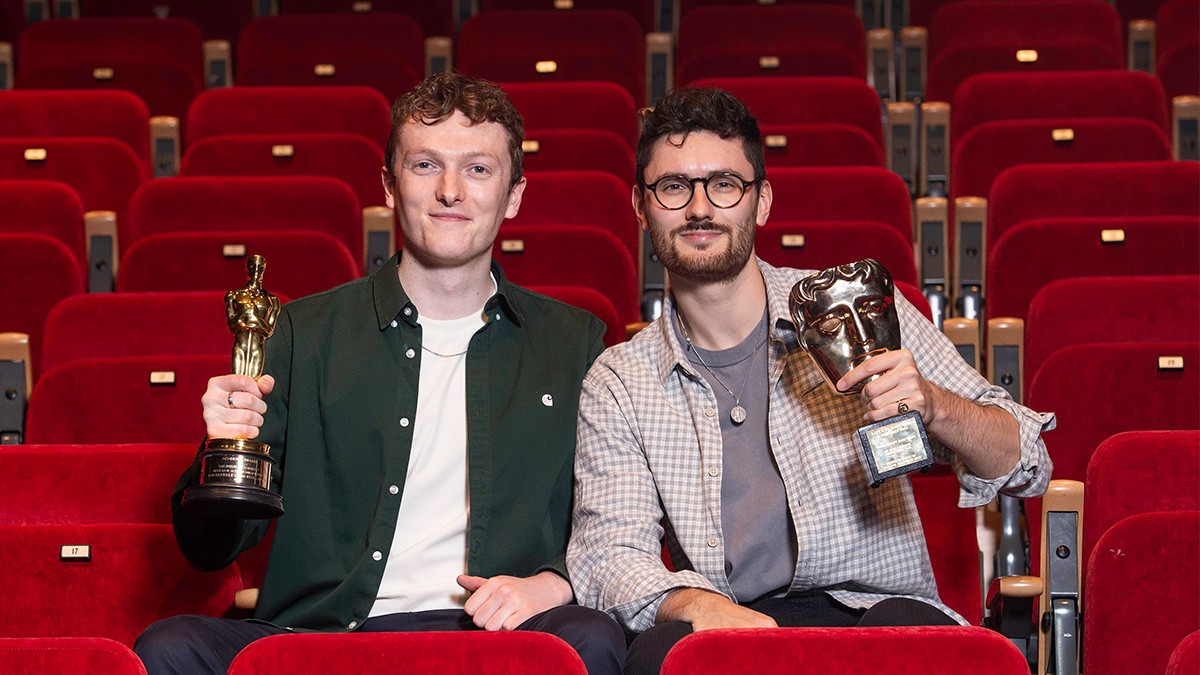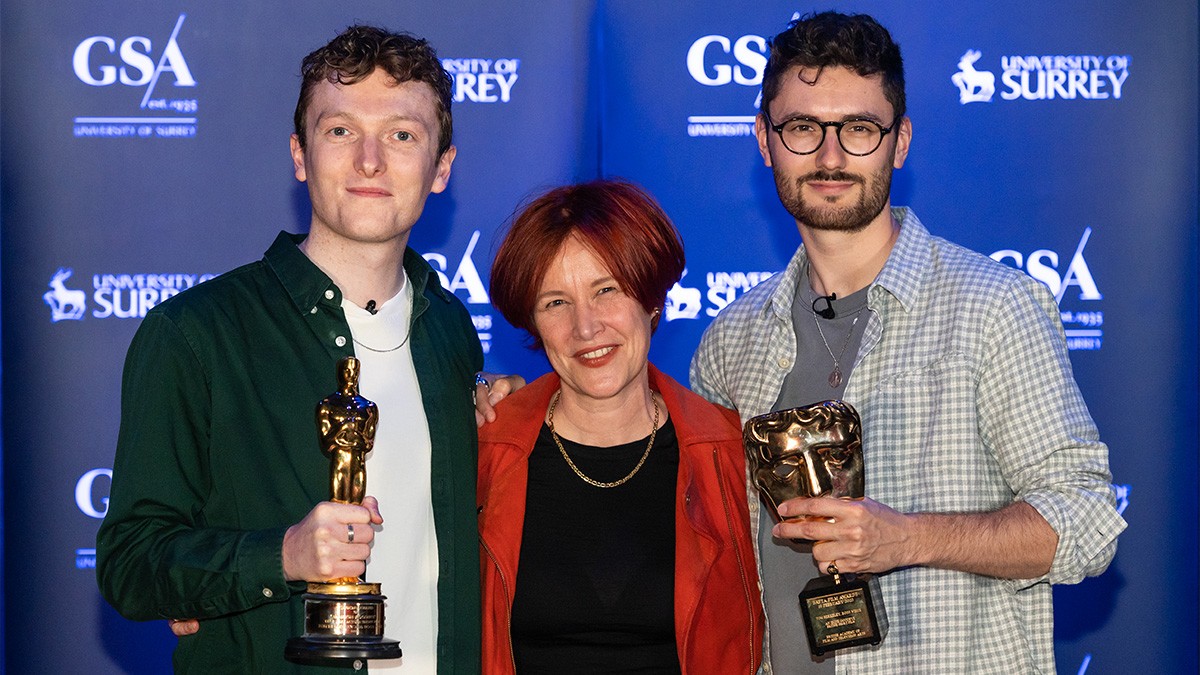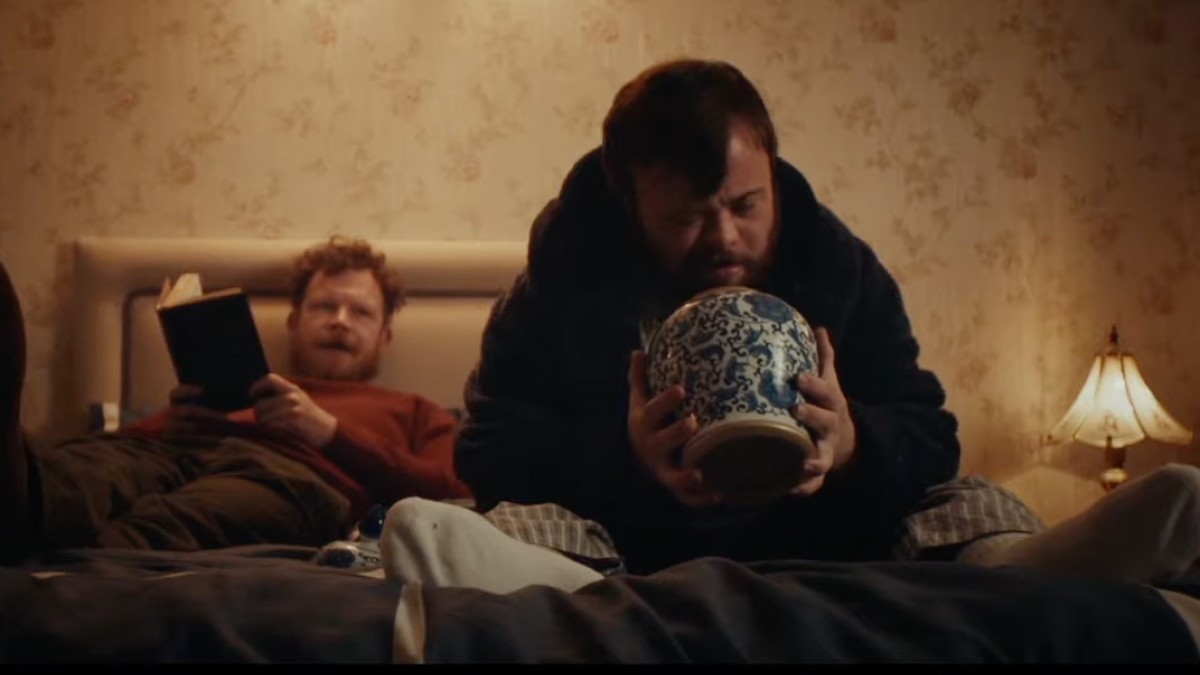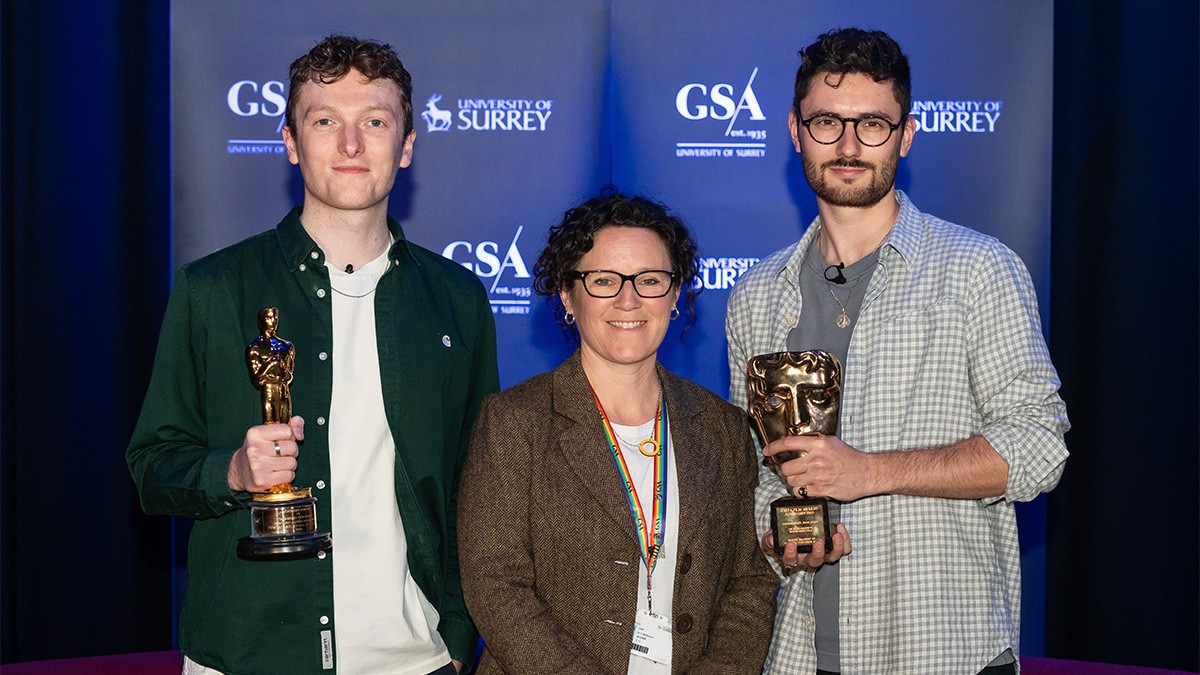Full-length Q&A with Ross White and Tom Berkeley
Tom Berkeley and Ross White graduated from Guildford School of Acting (GSA) in 2017. Their first short film, Roy, was long-listed for a BAFTA. Their second, An Irish Goodbye, won an IFTA, a BAFTA and an Oscar in 2023. The duo are also our Young Achievers of the Year in the Vice-Chancellor’s Alumni Awards.

Ross and Tom clutching their Oscar and BAFTA trophies
Why did you choose to study at GSA?
Tom: I auditioned for half a dozen drama schools. My thinking going into this process was to disregard any preconceptions about individual places and judge them purely on the audition process. There was a completely different energy about the GSA audition in the sense that it was incredibly collaborative and supportive. It was a lovely atmosphere. I came away from it thinking, “Whether I get in or not, I’ve had a great day. I feel like I’ve done well.” When the offer came through, accepting it was an easy decision to make.
Ross: GSA had built this incredible tradition with Northern Irish actors. I had friends who studied at GSA and I looked at it as a kind of pinnacle. GSA also came to Belfast to stage auditions, which made a big difference for me.
I did a one-week summer course on campus, too, and I kind of fell in love with the place. It’s a beautiful part of the world, the surroundings are gorgeous, and the facilities and the buildings are state of the art. I got a bit of a taste for what the routine might be like from that. When I auditioned and got the offer, the decision to accept was a no-brainer.
What sparked your interest in drama?
Tom: I was interested in acting from the age of 13, then I joined the National Youth Theatre at 15. That experience solidified my career path for me. Going away and doing that was a formative period. I was working with people who were in their late teens, and some of them were going to drama school. I was hearing about the process of training to become an actor and being in that environment invigorated me to pursue it.
From that point on, I knew I wanted to eventually end up at a drama school and pursue acting. I’d also been interested in writing plays when I was in my mid-teens. Acting and writing were mixing in with a more general interest in storytelling.
Ross: I was drawn to the nature of the training at GSA as well. There’s a vocational and hands-on approach. Every day you’re increasing your skill sets and building yourself up. You can throw yourself in and immerse yourself in everything that’s going on around you. That opens a lot of creative avenues that you maybe didn’t know about.
The actor is always the front-facing part of any kind of story and that’s probably where my initial inspiration came from. Then you work with directors, writers and other creatives, and you start to understand the holistic process involved in producing a script or a piece of theatre. This involves a lot of talent behind the scenes. That inspired me to move into directing and writing.
What were the best bits of the course?

Ross and Tom with their GSA tutor, Dr Jaq Bessell
Tom: The ethos of collaboration and the idea that you could promote and create your own artistic endeavours was great. The first thing I saw when I started at GSA was an extracurricular show that students had put on. It was a two-person version of the Oscar Wilde play, The Importance of Being Earnest. I was blown away that something of this quality had been made outside of School hours as a sort of side project.
Ross: I’d agree that the spirit of cross-course collaboration imbued throughout the School is a big selling point. It’s also one of the key lessons that sustains us now in filmmaking. That’s such a collaborative medium, and it requires an ability to connect, adapt and work with people from different disciplines towards a common goal. Learning about that began at GSA for us.
You also work with such skilled people here, both in terms of staff and visiting professionals, that you develop this toolkit in all these different areas. So you may have workshops on movement or musical theatre, which you wouldn’t suggest are primary skills for filmmaking. But you pick up nuggets of transferable wisdom you can apply across disciplines. We absorbed this into our work and it’s given us a shared vocabulary we still use.
What’s your happiest memory of Surrey?
Tom: The campus is beautiful. I remember sitting down by the lake in the sunshine and reading plays. I also remember it as a very creative space and a lovely place to be doing that.
Ross: For me, it was all the extracurricular stuff we were inspired to do. We sort of managed to take things that were born from the course and develop them further. So we founded a theatre company, and we took productions into Europe and we toured around the UK. One of the best things any university or college can do is to inspire you to take what you’ve learned and push it that step further.
How did you go from graduates fresh out of GSA to setting up Floodlight Pictures and making Roy with David Bradley?
Tom: We still had the theatre company when we graduated and we were still producing plays for a few years. That meant we had this background in producing and we had experience in building something from the ground up and seeing it through. It was a blessing that the company was going so well. But we also had to ask ourselves if we wanted to just be theatre producers.
At that point, we realised we had this real love of writing and we wanted to do that together. We said goodbye to the theatre company, but we quickly set up Floodlight as a vehicle to explore projects for the screen.
I moved back to Gloucester and Ross moved back to Belfast, and we spent a lot of time on Zoom writing together every day on a live document. We didn’t really know at that point what form things were going to take or what avenue we wanted to go down. We weren’t aware of short film as a medium either, then we sort of discovered them and we started watching a lot of them. We realised quite quickly that these have generally always been built from the ground up and independently financed, so it was very akin to what we were doing with the theatre company. So we felt we had the skills to produce something.
Ross: Roy was a very small film as well. It was contained and feasible. We also thought that if we could write a good script with a good character who we’d both liked to have played as actors, then we could maybe attract somebody of note.
We finished the script and we were quite happy with it, and we wrote to David Bradley explaining what we wanted to do with the project. We tentatively asked if it was something he’d consider appearing in. Amazingly, he bought into the story, he agreed to play the lead role and he was incredibly supportive of the project. That was a key lesson for us, too. If the work is engaging enough and it connects with people, you can end up working with brilliant people.
David finished shooting Roy with us, then he went straight into shooting the Guillermo del Toro version of Pinocchio. It goes to show how seriously and passionately he takes his craft. This acclaimed actor had no hang-ups about working with first-time filmmakers. He simply liked the story and he wanted to help us tell it.
We also had a lovely moment on the awards circuit. Roy was long-listed for a BAFTA and we bumped into David as he was nominated for Pinocchio.
You’ve won an IFTA, a BAFTA and an Oscar for An Irish Goodbye? What were your initial ambitions for the film?

Seamus O’Hara and James Martin in An Irish Goodbye
Tom: We wanted to tell a good story that we were proud of. You live with these projects for so long – from concept to pre-production to filming, editing and the festival circuit – that you must love what you’ve created. For example, we wrote the first draft of An Irish Goodbye in 2020 and here we are in 2023 talking about it. So you must love the story because it’s going to have that type of longevity.
Ross: We also wrote it from quite an instinctive place. We created the concept of the estranged brothers, one of whom lives on a farm in rural Northern Ireland, and they reconnect following the death of their mum. If you haven’t seen it, it’s a black comedy about men grieving badly. It spoke to both of our sensibilities and it excited us as a story.
Then we had to learn about the film festival circuit, and how films qualify for the BAFTAs and the Oscars. We didn’t think we’d ever get there. But we came away feeling proud of the work and, ultimately, we hoped it would find an audience. We were bowled over by the fact that it did. In the end, it played on six continents at about 70 film festivals.
What was the winning moment like at the Oscars?
Tom: It was surreal. They give you a running order listing all the various categories and Short Film was supposed to be towards the end of the ceremony. So we thought we were going to have a good hour or so to chill out, relax and enjoy it.
Then somebody with a camera came up and said, “Your category is next because they’ve changed the running order.” Suddenly, time speeds up and they’re announcing the nominees, then they’re saying the name of our film as the winner… We didn’t have time to get nervous. It took us all by surprise.
I also had a sort of memory blackout from between them calling the name of the film as the winner and us singing Happy Birthday on stage to actor James Martin, who plays Lorcan. My recollections sort of kick back into action during that song. I remember looking out and seeing Harrison Ford and Cate Blanchett joining in. Even now, when I have footage of it all, I still wonder, “Did I dream it? Did it really happen?”
Ross: I remember looking out to the audience and seeing Cate Blanchett looking back at me, and I was like, “Oh, my God!” . We tried very hard to be present and enjoy it, but I felt like I was floating on air for the whole day at the Oscars. We had a moment where we bumped into Bill Nighy, who’s another GSA alumni, and we had a chat about us going to the same acting school. It was an amazing experience because you grow up watching it as this other-worldly event, then you end up being there as a nominee.
I remember we got backstage after the presentation and we had the Oscar statues in our hands. I hadn’t looked at it at that point. I remember peering down and seeing it in my hand. That’s when I burst into tears. It was this sudden rush of emotion that comes from that little gold man.
What did winning the Oscar mean for you?
Tom: The good thing about winning awards is that they allow you to keep making work, and they hopefully expedite the process towards longer-form work. We’re now working on our debut feature film.
Ross: Awards open doors. We’ve been fortunate to sign with two prestigious agents, Independent in London and WME in the USA. That’s created opportunities to meet great people.
But we’re aware that we must strike a balance of making the most of these opportunities, while not changing the recipe of how we’ve achieved success too much. All of this was born out of a DIY spirit, and us working with people we’re close to and telling stories we buy into. We need to protect that as we move forward, even though our artistic ambitions and our budgets may get that bit bigger.
An Irish Goodbye ends with the brothers at a beautiful moment of tender reconciliation. What’s next for you?
Tom: We’ve just finished our third and probably final short film, The Golden West. We shot it Wales just before Christmas and we’re hoping that we’ll do the festival circuit from late summer onwards. That means we can hibernate away for a bit beforehand and spend some time working on the full-length feature. We’re chomping at the bit for this opportunity. We feel like we’re ready to make that step towards long-form work and solidify a career as filmmakers.
Can you tell us anything about this?
Ross: We’ve got two or three ideas we’re sort of toying with. We’ve yet to really decide on one.
What advice would you give to students wanting to follow in your footsteps?

Ross and Tom with the Head of GSA, Dr Catherine McNamara
Tom: Finding your people is key in any kind of work, but it’s especially important in creative work. Writing can be a lonely discipline, so finding good collaborators to surround yourself with and share the journey with is very important.
Finally, what does it mean to be chosen as Young Achievers of the Year in the Vice-Chancellor’s Alumni Awards?
Tom: It’s obviously great to win major awards like the IFTA, BAFTA and the Oscar. But this recognition from the University felt more intimate.
The University and GSA has such a personal connection to us and our history. We met here, built a theatre company here and became creative collaborators here. To be recognised by the institution that helped nurture us is really touching and heartening, and we’re thankful for that.